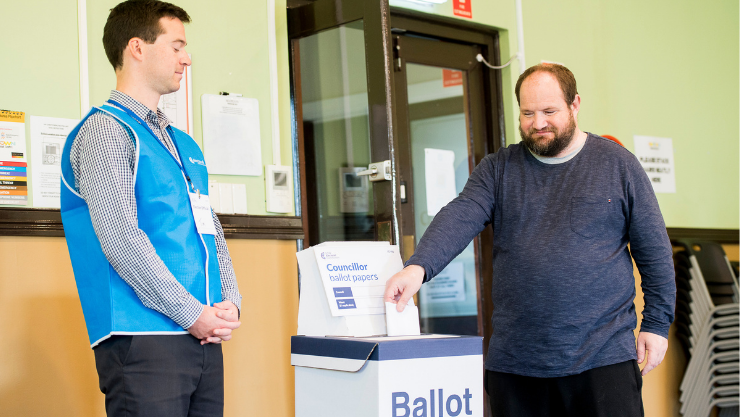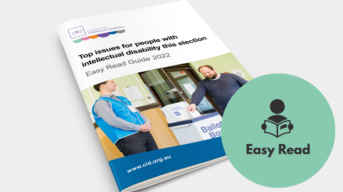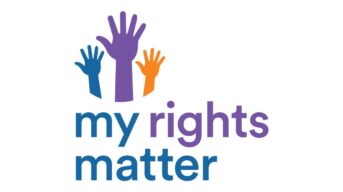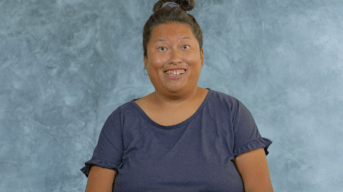
Federal election 2022 – Our key issues and asks
Health of people with intellectual disability
People with intellectual disability face stark health inequalities leading to at least 38% of people dying from potentially avoidable causes and dying 27 years earlier than the general population.
CID applauds the National Roadmap for Improving the Health of People with Intellectual Disability which was launched by Health Minister Hunt in 2021. We applaud the Labor Party and Greens who have joined the Government’s commitment
to implementation of the Roadmap.
Leading up to the election, we also wanted commitments from the parties to fund a National Centre of Excellence in Intellectual Disability Health. This Centre will be a key driver of action on the Roadmap.
We applaud the announcement on 20 April 2022 by Minister Hunt of funding for:
- Establishment of the National Centre ($3m in 2022-23 and $5m in 2023-24)
- Research on the health of people with intellectual disability ($20m in 2024-25)
And we applaud the Labor Opposition for matching these commitments.
We call on the incoming government to continue robust action to implement the National Roadmap for Improving the Health of People with Intellectual Disability including by ensuring ongoing core funding of the National Centre of Excellence in Intellectual Disability Health.
For more information, see the End Deadly Disability Discrimination campaign.
The NDIS
The NDIS can change the lives of people with disability by providing them with choice and control in their lives and funding for the support they need to live full lives in the community. The NDIS has fulfilled this promise for many people.
However, there are many problems with the scheme that are leaving people frustrated and poorly supported.
CID supports:
- The Defend the NDIS campaign of Every Australian Counts.
- Inclusion Australia’s advocacy in relation to employment opportunities for people with intellectual disability with a focus on access to open employment and fair wages.
- The Down to 10 Days campaign to stop people with disability having to wait months or years for the support they need. For example, people are stuck in hospital because it is so slow to get NDIS support.
We also highlight two other key issues:
The missing link in the NDIS
Right now, the NDIS is like an oasis in the desert. The only way people can get the support they need is to get a funded package as a participant in “Tier 3” of the NDIS. But there is supposed to be another part, called “Tier 2”, to help people with disability
even if they are not participants. If you can’t get the support you need outside the oasis, of course you need to be on it.
In line with the original Productivity Commission report, we say that the next government should reinvigorate “Tier 2” of the NDIS, including:
- A revamped national network of local area coordinators (LACs) who are available to all people with disability to help them access mainstream services and general community supports and with minor crises which impede their independence. The role of LACs needs to be shifted from participant plans to helping other people with disability.
- Projects to enhance the capacity of people with disability to live independently and to build the capacity of mainstream services to meet people’s needs (Information, Linkages and Capacity Building projects – ILC). To date, these projects have often been poorly targeted. We welcome the recent review of the ILC by Swinburne University.
- Recurrent funding of disabled persons and family organisations to assist people develop their capacity to take control of their own lives.
The design of Tier 2 needs to consider diverse needs, including the particular needs of Indigenous Australians and children.
Our view on Tier 2 is consistent with advice provided by the NDIS Independent Advisory Council to the NDIA Board and the government.
In July 2021, the IAC called for 1% of the NDIS budget – that is about $270 million a year – to be devoted to Tier 2.
Tier 2 would work alongside the new Australian Disability Strategy which focuses on all levels of government taking responsibility for mainstream services being accessible and appropriate for people with disability.
We call on the political parties to commit to funding a reinvigorated Tier 2 of the NDIS including local area coordinators, funded projects and disabled persons and families organisations.
Barriers to the NDIS for people in the criminal justice system
The Disability Royal Commission has highlighted barriers preventing people with disability in the criminal justice system from accessing NDIS supports. For example the NDIS funds supports for “challenging behaviour” but not “offending behaviour”, which the NDIA claims to be the responsibility of the justice system. This is a false distinction. “Challenging behaviour” does not magically stop being related to inadequate disability support just because a person is charged with an offence or imprisoned. All too often, people get into trouble with the police because of the inadequacies of their disability supports.
NDIS barriers lead to people being stuck in prison because they do not have “reasonable and necessary” accommodation and support available in the community.
We call on the political parties to ensure that people with intellectual disability who have committed offences have full and fair access to the NDIS like anybody else.
COVID and disaster planning
We support the Leave No Australian Behind in Disasters and Emergencies campaign led by People with Disability Australia and Queenslanders with Disability Network.
Also, Covid continues to have major impact on people with intellectual disability. Some people with intellectual disablity are not vaccinated or find it hard to understand social distancing and other Covid safety practices. They are at risk of serious illness and death, and major restrictions on their access to the community.
We support the call by national peaks for a national Covid Recovery Plan for People with Disability.
Two particular problems are:
- The continuing gap in vaccination rates between people with disability and the general community. NDIS participants over 16 lag behind the general community in double vaccination rates by nearly 10% (86% compared with 95%).
- Very few people with intellectual disability are eligible for a fourth vaccination shot unless they are living in group supported accommodation. It is inconsistent that anyone aged over 65 is eligible for the fourth shot but not people with disability who are at risk due to factors including their wide range of health conditions.
We call on the political parties to close the gap in vaccination rates between people with and without disability and to make fourth vaccinations available to all people with disability.
Increased funding for disability advocacy
We welcome the Disability Advocacy Futures Programme of the NSW government which has provided increased access to advocacy in relation to state issues.
However, federal government funding of advocacy remains deficient, in particular, to meet the high and increasing need for individual advocacy relating to challenges dealing with the NDIS and appealing NDIS decisions.
We call on the political parties to commit to increased funding of disability advocacy.
The right to vote
Right now, a person can be stopped from voting in federal elections if they are of “unsound mind”.
CID is one of 65 organisations who have called for reform of this offensive and discriminatory provision.
We call on the political parties to commit to reform of the “unsound mind” provision in the Commonwealth Electoral Act.
CID’s Advocacy Team
Jim Simpson, Senior Advocate



 1800 424 065
1800 424 065 















